CLICK ON IMAGE BELOW TO SEE FULL SCREEN SHOTS TWEETED BY ALEX HELLER-NICHOLAS
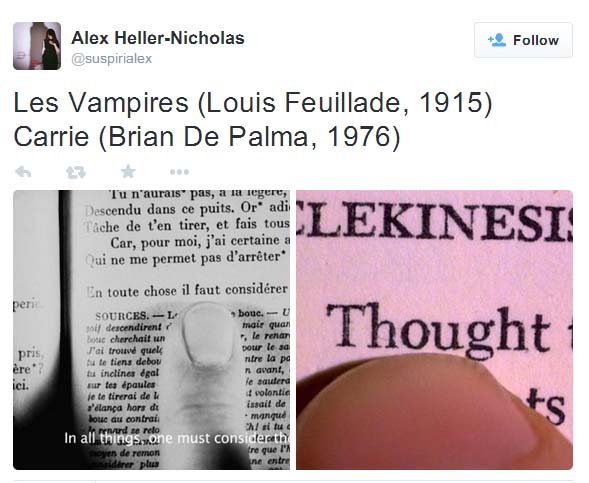
 Hello and welcome to the unofficial Brian De Palma website. Here is the latest news: |
|---|
E-mail
Geoffsongs@aol.com
-------------
Recent Headlines
a la Mod:
Listen to
Donaggio's full score
for Domino online
De Palma/Lehman
rapport at work
in Snakes
De Palma/Lehman
next novel is Terry
De Palma developing
Catch And Kill,
"a horror movie
based on real things
that have happened
in the news"
Supercut video
of De Palma's films
edited by Carl Rodrigue
Washington Post
review of Keesey book
-------------
Exclusive Passion
Interviews:
Brian De Palma
Karoline Herfurth
Leila Rozario
------------
------------
| « | February 2015 | » | ||||
| S | M | T | W | T | F | S |
| 1 | 2 | 3 | 4 | 5 | 6 | 7 |
| 8 | 9 | 10 | 11 | 12 | 13 | 14 |
| 15 | 16 | 17 | 18 | 19 | 20 | 21 |
| 22 | 23 | 24 | 25 | 26 | 27 | 28 |
De Palma interviewed
in Paris 2002
De Palma discusses
The Black Dahlia 2006

Enthusiasms...
Alfred Hitchcock
The Master Of Suspense
Sergio Leone
and the Infield
Fly Rule
The Filmmaker Who
Came In From The Cold
Jim Emerson on
Greetings & Hi, Mom!
Scarface: Make Way
For The Bad Guy
Deborah Shelton
Official Web Site
Welcome to the
Offices of Death Records
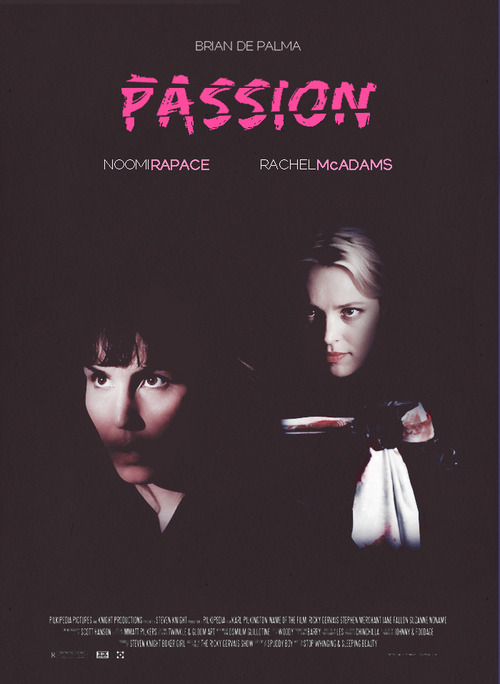 I thought I had covered all of the 2013 top ten and best-of lists that included Brian De Palma's Passion with three posts from about a year ago: January 2, 2014, January 8, 2014, and February 6, 2014. However, I should have known to check the individual lists of the critics from Cahiers du Cinéma. Even though Passion did not make the magazine's final top 10 for 2013, De Palma's film did appear on three of the individual lists. Here they are:
I thought I had covered all of the 2013 top ten and best-of lists that included Brian De Palma's Passion with three posts from about a year ago: January 2, 2014, January 8, 2014, and February 6, 2014. However, I should have known to check the individual lists of the critics from Cahiers du Cinéma. Even though Passion did not make the magazine's final top 10 for 2013, De Palma's film did appear on three of the individual lists. Here they are:
Nicolas Azalbert
Jean-Sébastien Chauvin
Stéphane du Mesnildot
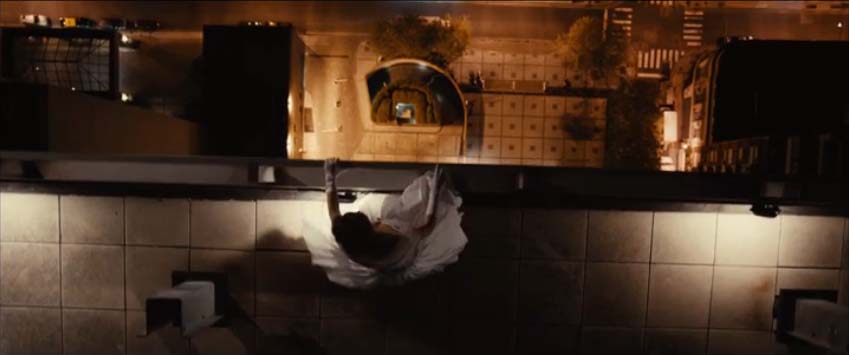
The film is made up of six episodes, each with a different cast and characters, in which someone goes into a vengeful rage. Building on the imagery of the opening credits, Szifrón explains to Rohter, "What differentiates us from animals is our capacity to restrain ourselves. An animal can’t, and is condemned to its instincts. In contrast, we have a fight or flee mechanism, but it comes with a very high cost. Most of us live with the frustration of having to repress oneself, but some people explode. This is a movie about those who explode, and we can all understand why they do. Any time I read about someone who has committed a supposedly irrational or barbarous act, that person doesn’t feel foreign to me." Szifrón later adds that while the six stories may be stylistically different from each other, "they are vital organs of the same body" and "to sustain itself, the movie needed all of them."
A CINEPHILE WHO SAW ALL THE CLASSICS AT A VERY EARLY AGE
In this excerpt from the end of Rohter's article, he discusses Szifrón's influences, which include Brian De Palma:
Born in the suburbs of Buenos Aires into a Jewish immigrant family with roots in Poland and Russia, Mr. Szifrón was a cinephile as a boy. His father dealt in electronic equipment, and his son early on acquired a VHS player and a digital camera. As a result, Mr. Szifrón said, “I saw all the classics at a very early age.” He began making his own shorts at the age of 9, and before Wild Tales, he had written and directed two movies and a pair of television series that were hits in Latin America.Wild Tales contains echoes of some of his childhood favorites, among them Woody Allen, Steven Spielberg and Brian De Palma, as well as The Twilight Zone and Alfred Hitchcock Presents. But in the end, the movie is a very personal distillation of “themes that are in the collective unconscious,” Mr. Szifrón said.
“There are a lot of different things from daily life being processed and given free rein in Wild Tales, violence and vengeance among them,” he continued. “But at its core, what stands out is this pleasure of losing control and the desire for liberation. This is a movie about the desire for freedom, and how this lack of freedom, and the rage and anguish it produces, can cause us to run off the rails.”
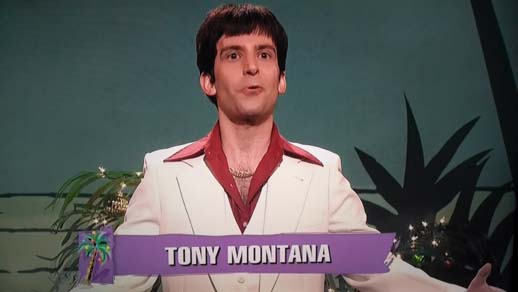 Thanks to Matthew for sending in these two captures from the Saturday Night Live skit, "A Very Cuban Christmas." The skit, which you can watch on Hulu, originally aired on the December 20th episode. It's a big irreverent jumble thrown together after the U.S. and Cuba made a joint announcement three days earlier that they planned to work together to re-establish diplomatic relations. SNL cast member Kyle Mooney played Tony Montana, with that week's host, Amy Adams, as Elvira. The fictional Montana spouts the fictional declaration that "the best news is, the embargo of Cuba has been lifted. Tell 'em what that means, baby!" Elvira replies, "First we get the money, then we get the cell phone, then we get the Walmart." Tony then says, "That's right! Now why don't you say hello to my little friend-- it's Elian Gonzalez, and he's all grown up!"
Thanks to Matthew for sending in these two captures from the Saturday Night Live skit, "A Very Cuban Christmas." The skit, which you can watch on Hulu, originally aired on the December 20th episode. It's a big irreverent jumble thrown together after the U.S. and Cuba made a joint announcement three days earlier that they planned to work together to re-establish diplomatic relations. SNL cast member Kyle Mooney played Tony Montana, with that week's host, Amy Adams, as Elvira. The fictional Montana spouts the fictional declaration that "the best news is, the embargo of Cuba has been lifted. Tell 'em what that means, baby!" Elvira replies, "First we get the money, then we get the cell phone, then we get the Walmart." Tony then says, "That's right! Now why don't you say hello to my little friend-- it's Elian Gonzalez, and he's all grown up!"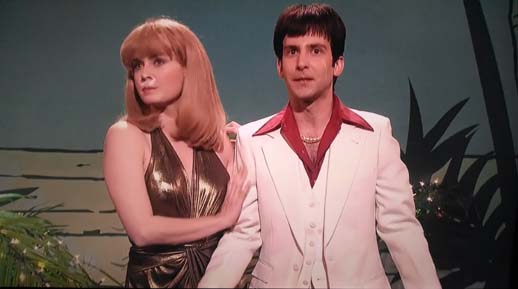
GRANTLAND'S "DEFLATEGATE"
Meanwhile, on January 30th, prior to the Super Bowl, Grantland posted the video below to YouTube with the description, "Grantland has cell-phone footage of Bill Belichick at a team dinner addressing the scrutiny the Patriots have been under heading into Super Bowl XLIX in Glendale, Arizona."
DEADLINE: As you build your production company now with Todd Phillips, how has this philosophy of stripping down to the core influenced how you look at a piece of material?
COOPER: It’s there. But I’ve been very lucky to be brought up by great storytellers, starting with JJ Abrams initially on Alias. I’m from the East Coast and got planted out there in LA and it was like a self-imposed grad school for film. I’d go to the end of the room every day and get everybody’s dailies on videotape and watch them. I learned so much there just about the mechanics of it. Then I learned more on this movie The Midnight Meat Train. With Limitless I really got to work on story, and that brings me to David O. Russell, who is all about that. Where’s the f*cking heart, where’s the f*cking heart, give me the real thing, drop the bullsh*t. He loves to celebrate life and nostalgia and comedy, but there is no bullsh*t. And when you’re working with him, you better not f*cking act.DEADLINE: He’s not a fan of theatrics?
COOPER: No. He wants to see your soul. I’ve had it jammed in me for so long that by the time I landed on Sniper, I was ready for the way Clint operates. It’s always about, what are we getting at here? There it is, there’s the f*cking mitochondria, this is the sh*t right here, that’s the powerhouse. So, we were on the same page, me and Clint, and that meant no frills, let’s just tell a simple story. We knew that character was charismatic. The guy’s amazing. He’s fucking huge. He’s got this amazing voice. He’s got this levity about him. He has this way of thinking about the world that I’ve never seen on film, quite frankly. When the psychiatrist asks him about himself and how he’s doing, you’re not expecting that answer. I wasn’t. But that’s real to him and you’re looking in his eyes and thinking, what’s going on there? That’s interesting to us, that’s an interesting enough character to fill the frame. You don’t have to come up on a f*cking Brian De Palma thing or come overhead like…no, that’s it, right here.DEADLINE: Or having the shrink comment that his eyes betray the fact he’s not right?
COOPER: Yeah, well, that’s just Jason Hall making it real, but we were all on the same page. Chris led the way.
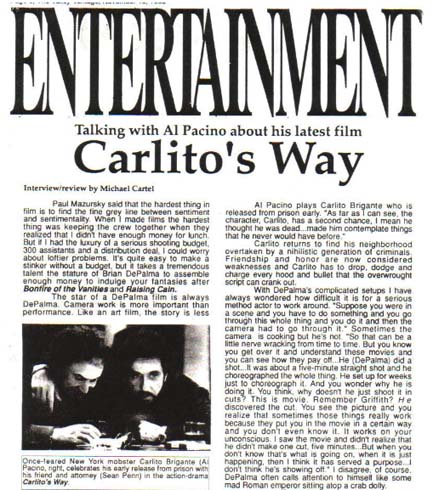 Michael Cartel, whose 1982 movie, Runaway Nightmare, was remastered and released on Blu-ray last year, was not a fan of Brian De Palma's Carlito's Way when he interviewed Al Pacino upon the film's release. Cartel recently posted the 1993 interview/review on his Runaway Nightmare website. In the interview, Pacino tells Cartel that he read the Edwin Torres books "long before I did Scarface," and worked on the idea of a movie adaptation for years. Meanwhile, Cartel writes in the article that he was "miffed" that Pacino took on this project just after his Oscar win for Scent Of A Woman.
Michael Cartel, whose 1982 movie, Runaway Nightmare, was remastered and released on Blu-ray last year, was not a fan of Brian De Palma's Carlito's Way when he interviewed Al Pacino upon the film's release. Cartel recently posted the 1993 interview/review on his Runaway Nightmare website. In the interview, Pacino tells Cartel that he read the Edwin Torres books "long before I did Scarface," and worked on the idea of a movie adaptation for years. Meanwhile, Cartel writes in the article that he was "miffed" that Pacino took on this project just after his Oscar win for Scent Of A Woman.Cartel then states in the article that he disagrees, adding, "De Palma often calls attention to himself like some mad Roman emperor sitting atop a crab dolly." A bit later, Cartel discusses Sean Penn, writing that "Penn is the superb standout in this tedious melodrama." And Cartel shows disdain for the ending of the film: "David Koepp adapted the books into a script and swiftly got stuck for an ending. Producer Martin Bregman worked with Koepp for two years on this project and decided to tie up the denouement by having a mysterious character reappear and perform an unbelievable solution for the production company.
"Script analyzers for literary agencies are unpublished scriptwriters with jealous, heartless souls. But they do keep film stories with gaping holes from going further than their own desks. Apparently the messenger was shot in Bergman's office before she could escape with the bad script news."
While Cartel felt at the time that "Carlito certainly won't be Pacino's defining role," he predicted that "Sean Penn will garnish several awards for his performance in this film."
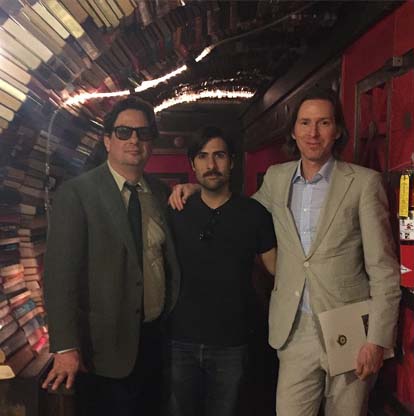 Pictured here from left-to-right are Roman Coppola, Jason Schwartzman, and Wes Anderson, posing last month at The Last Bookstore in Los Angeles. The Frame's John Horn interviewed Anderson recently at his suite at the Chateau Marmont in West Hollywood, where, according to Michelle Lanz' written introduction, "he was working on a screenplay with Jason Schwartzman and Roman Coppola for a planned animated film!"
Pictured here from left-to-right are Roman Coppola, Jason Schwartzman, and Wes Anderson, posing last month at The Last Bookstore in Los Angeles. The Frame's John Horn interviewed Anderson recently at his suite at the Chateau Marmont in West Hollywood, where, according to Michelle Lanz' written introduction, "he was working on a screenplay with Jason Schwartzman and Roman Coppola for a planned animated film!"[John Horn] You co-wrote "Budapest" with Hugo Guinness. What advantages are there working with a writing partner and what is it like? Are you guys throwing lines out or are you doing it all electronically?[Wes Anderson] Roman and Jason should be walking in the door in two-and-half minutes and this is how we do it: I'm just pointing to a notebook with a stack of notes and pages here...
With some incredibly neat handwriting...
Oh, I keep it very neat, yes. As you can see, this is, you know: "De Palma Sequence." It has nothing to do with De Palma. That's a person we're trying to steal from. It's actually an action sequence we're trying to write for an animated film that we have in mind. It's a kind of scene where, really what we ought to be doing is we ought to be bringing in the De Palma blu-rays and imitating them very precisely. Right now we're winging it a bit. We're going De Palma-esque but we probably just need to go De Palma.
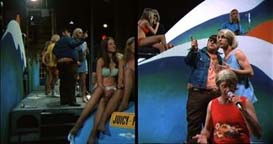 Brian De Palma's Phantom Of The Paradise will screen at 8:30pm this Thursday, February 12th, as well as 6:10pm Sunday, February 15th, at the BFI (British Film Institute). "As outlandish today as it was four decades ago," reads the BFI event description, "De Palma’s Faustian riff on The Phantom of the Opera is perhaps his most idiosyncratic work. When a brow-beaten composer has his cantata stolen by a demonic music tycoon, he’ll stop at nothing to see his music performed by the woman he loves. A musical phantasmagoria unlike anything you’ve ever seen."
Brian De Palma's Phantom Of The Paradise will screen at 8:30pm this Thursday, February 12th, as well as 6:10pm Sunday, February 15th, at the BFI (British Film Institute). "As outlandish today as it was four decades ago," reads the BFI event description, "De Palma’s Faustian riff on The Phantom of the Opera is perhaps his most idiosyncratic work. When a brow-beaten composer has his cantata stolen by a demonic music tycoon, he’ll stop at nothing to see his music performed by the woman he loves. A musical phantasmagoria unlike anything you’ve ever seen.""Phantom of the Paradise could well have represented a pyrrhic victory of style over substance, beating its audience into submission with all of its chromatic fireworks and brouhaha, yet there is a touching romance as its core...
"Of course the film is anchored in the 70's and wonderfully so, and yet it feels strangely timeless, as if it was already so over the top for the era it was made that it has transcended it. Flamboyant and frankly insane, Phantom of the Paradise is an absolute delight and a must-see for a cult fans."
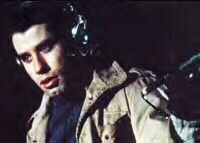 This month, the Trylon microcinema in Minneapolis is running a series called "Masterpieces Of Paranoia" on Mondays and Tuesdays. This week's film is Brian De Palma's Blow Out, which screened last night and tonight (Monday and Tuesday, February 9 & 10) in 35mm. The film will play at 7pm and 9pm. The other films in the series are John Frankenheimer's The Manchurian Candidate (which kicked things off last week), Alan J. Pakula's All The President's Men (Feb. 16 & 17), and Sydney Pollack's Three Days Of The Condor (Feb. 23 & 24).
This month, the Trylon microcinema in Minneapolis is running a series called "Masterpieces Of Paranoia" on Mondays and Tuesdays. This week's film is Brian De Palma's Blow Out, which screened last night and tonight (Monday and Tuesday, February 9 & 10) in 35mm. The film will play at 7pm and 9pm. The other films in the series are John Frankenheimer's The Manchurian Candidate (which kicked things off last week), Alan J. Pakula's All The President's Men (Feb. 16 & 17), and Sydney Pollack's Three Days Of The Condor (Feb. 23 & 24).
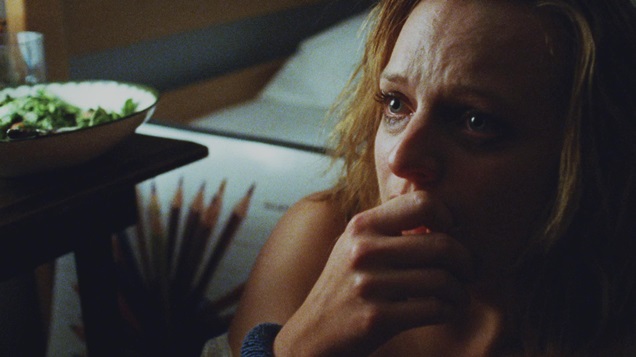
Perry tells Indiewire's Eric Kohn about making a smaller film this time around, and movies that inspired Queen Of Earth:
"All this came together during a Fassbinder retrospective at the Film Society of Lincoln Center. I went to a double bill of The Bitter Tears of Petra von Kant and Martha. I knew that was the kind of movie I wanted to make. From there, it became this fun little maze of what other kind of movies you can fold into this — you can take a very sad, emotional drama and find yourself talking about a cheap horror movie like Carnival of Souls and realizing it's more connected to those other films than they seem.
"The common thread here is these really interesting women stories — these unique, threatening and occasionally frightening stories about the troubles of broken women. That's the driving force behind almost all of Fassbinder's films. So immersing in a retrospective gives you time to marinate in this theme of women under extreme duress. But then you look at Carnival of Souls, or Roman Polanski's Repulsion, and it takes the form of exaggerated gothic horror. Then you look at Robert Altman's Images, which straddles both lines and becomes a fascinating text of its own. In his body of work, at the time of that film and now, that one sort of sticks out as this quasi-horror experiment. Then I was also thinking of Woody Allen's Interiors, which is as quiet a drama as you can have. I wanted this movie to live in this cinematic world of broken women."
Last September, Perry tweeted an image from De Palma's Body Double in response to being tagged to post a #cinephilephoto. And he mentions De Palma in an interview with Richard Porton in the Winter 2014 issue of Cineaste. Asked by Porton how working at Kim's Video influenced his film education, Perry replies, "That overlapped with my time at NYU. I distilled it down to one point: Working at a place like that taught me not to be afraid of what I liked. Film school teaches you to be very afraid of what you like. You don't want to be the one who stands up in class and says, 'I think Sylvester Stallone is an incredible director.' You're going to look like an idiot, especially at NYU where everyone is trying to be as highbrow as possible. Working at Kim's taught me, working with people like Sean [Price Williams], to like what you like. But you have to defend what you like about these films. You could come into Kim's and say, 'I want to rent the two-tape edition of The Mother And The Whore.' Eustache is an incredible filmmaker. But you needed to defend why you were renting Staying Alive or Rocky IV. Stallone is an incredible filmmaker and even Jean Eustache respected him.
"That's a lesson you'll never be taught in an academic setting—how to equally appreciate high and low cinema. At NYU, people might see Brian De Palma as a trashy filmmaker who made pulpy movies in the Eighties. When you were working at Kim's, Brian De Palma was the master."